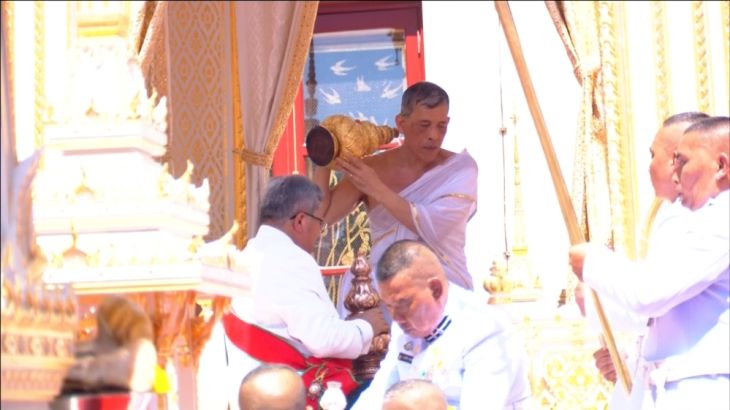Thailand’s King Vajiralongkorn crowned as divine monarch
The king has inherited one of the world’s richest monarchies and a kingdom submerged in political crisis.

Thailand‘s King Maha Vajiralongkorn has performed intricate Buddhist and Brahmin ceremonies to symbolically transform him into a living god as the Southeast Asian nation officially crowned its first monarch in nearly seven decades.
The king was joined by new Queen Suthida on Saturday after a surprise announcement three days before the coronation that the thrice-divorced monarch had married for a fourth time.
The king appeared dressed in white as he underwent a royal purification ritual, sitting under a canopied fountain that poured consecrated waters over his head.
The country’s Buddhist Supreme Patriarch also poured sacred waters over the king’s body, followed by Brahmin priests and royal family members.
Hundreds of state officials in immaculate white uniforms lined the streets around the Grand Palace.
King Vajiralongkorn, 66, became constitutional monarch after the death of his revered father, King Bhumibol Adulyadej, in October 2016 after 70 years on the throne.
Bhumibol was seen as a figure of unity in the politically chaotic kingdom. His son Vajiralongkorn, 66, is less well-known to the Thai public, preferring to spend much of his time overseas and rarely addressing his subjects.
The king’s coronation, after a period of mourning for the late king, comes amid the uncertainty of an unresolved election battle between the current military government chief and a “democratic front” trying to push the army out of politics.
King Vajiralongkorn has inherited one of the world’s richest monarchies and a kingdom submerged in political crisis.
Thai kings’ coronation rituals are a mixture of Buddhist and Hindu Brahmin traditions dating back centuries. One of the many official titles King Vajiralongkorn will take is Rama X, signifying that he is the 10th king of the Chakri dynasty founded in 1782.
“The monarchy is the only institution in this country that has lasted for more than 700 years,” Sulak Siwarak, a historian in Thailand told Al Jazeera.
“I think the new king means well about his country. He wants to do something significant.”
|
|
Royal patron of Buddhism
Saturday’s rituals are about transforming him into a “Devaraja”, or a divine embodiment of the gods.
As the waters started pouring, ancient cannons from the 19th century, used specifically for the coronation, started firing 10 volleys each.
The king will then change into a full uniform and take a seat on an eight-sided, carved wooden throne to receive sacred waters on his hands in an anointment ritual.
Selected officials, including military government chief Prayuth Chan-ocha, the head of the National Legislative Assembly, and the chairman of the Supreme Court, will pour the waters from eight directions, representing the cardinal and ordinal directions on a compass.
The waters used in both rituals were collected from 117 sources last month and blessed by Buddhist monks and Brahmin priests in temples around the country before they were combined and consecrated.
Before noon, the purified and anointed sovereign will sit under an elaborate nine-tiered umbrella, where he will receive the royal golden plaque containing his name and title, the royal horoscope, and the royal seal, which were made in a three-hour ritual last week.
The king will also receive and wear five articles of the royal regalia from the chief Brahmin.
Once in full regalia, the king will give his first royal command, a short utterance that will highlight the essence of his reign.
The king will proclaim himself the royal patron of Buddhism later in the evening, and perform a private housewarming ritual at the royal residence where he will stay the night, as previous kings have done.